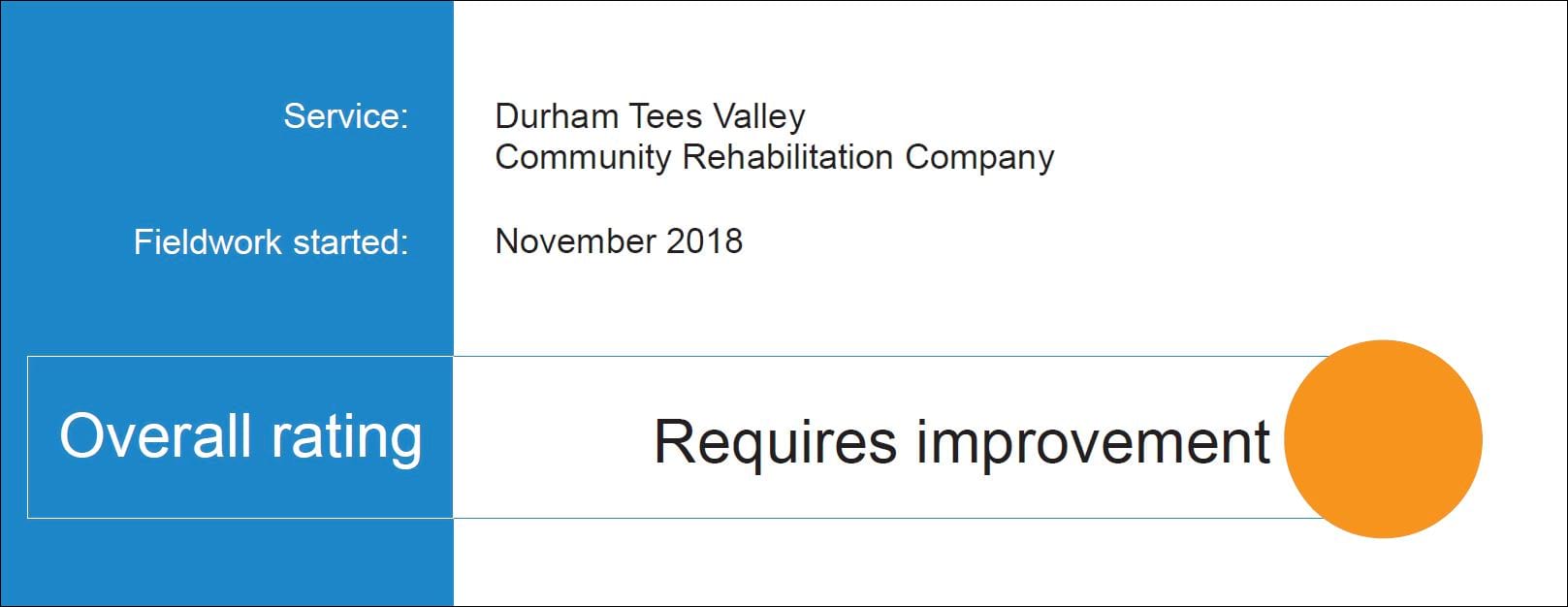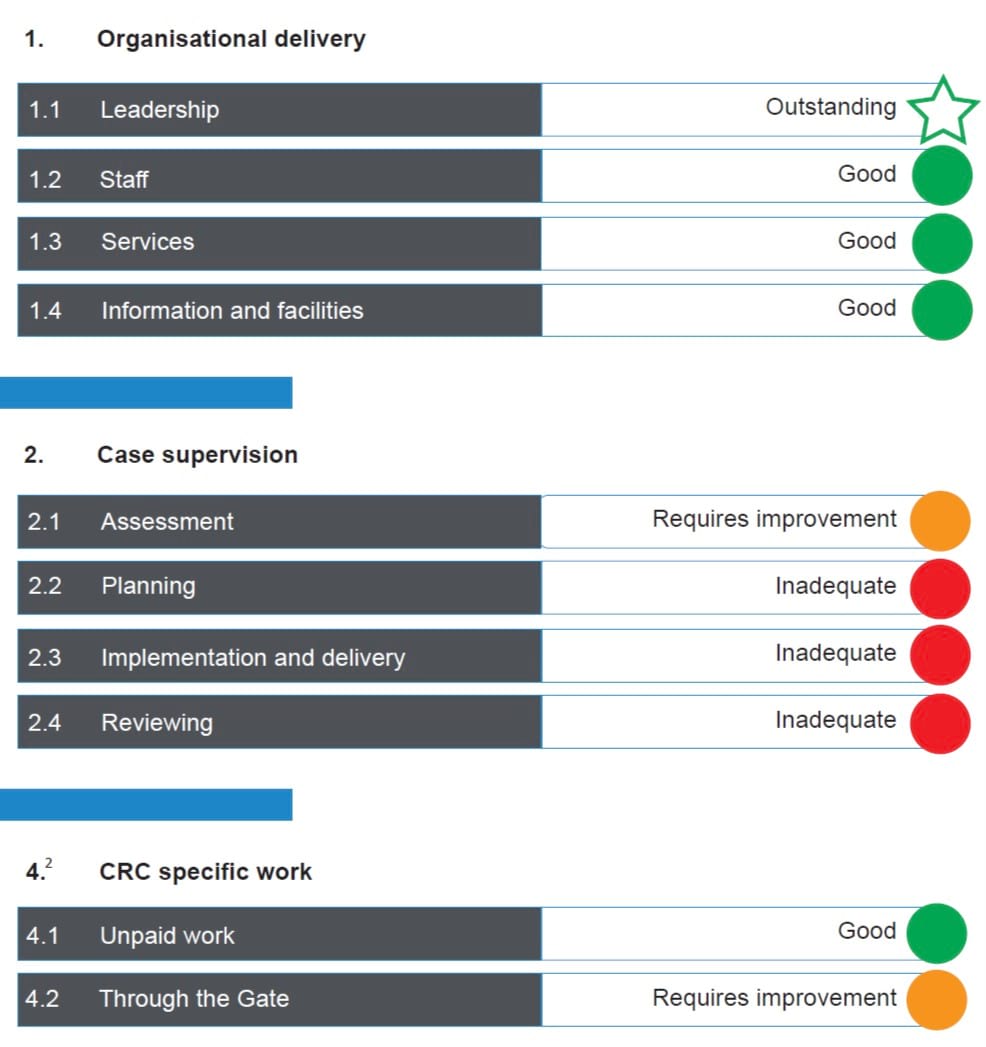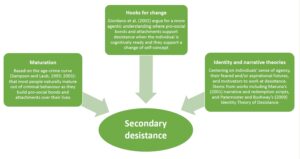Poor record keeping
Durham Tees Valley Community Rehabilitation Company (DTVCRC) was assessed by probation inspectors as ‘Requiring improvement’, the second lowest rating, despite its clear organisational strengths in a new inspection report published today (6 March 2019). DTVCRC s the only Community Rehabilitation Service run by a non-for-profit body, a consortium of nine partners from different sectors including local authorities, charities, other philanthropic bodies and social enterprise organisations providing wrap-around services.
HM Chief Inspector of Probation Dame Glenys Stacey said that governance at the CRC, which supervised 3,729 people at the time of the inspection in November 2018, was sound.
Senior leaders understood the challenges faced by the organisation. “Unusually, they have full control over strategy, policy and the budget. There is a strong and positive organisational ethos. Leaders and staff aim to improve the life chances of those under probation supervision and contribute to their rehabilitation.”
The report found staff felt proud to work for DTV CRC. Unlike in some other CRCs – Durham Tees Valley is the tenth to be inspected in 2018-19 – professional staff were “not overburdened with large caseloads.”
The CRC is structured with a number of community-based ‘hubs’, with a strong emphasis on local face-to-face engagement with offenders.
Despite these strengths, however, Dame Glenys added, inspectors still rated the CRC as ‘Requiring improvement.’
“When we last inspected this CRC, in 2016, we found its quality management arrangements wanting. Regrettably, that is still the case.” This was despite the particular importance of effective quality management in such a dispersed, local hub-based delivery model. Team managers in the CRC had a broad range of responsibilities and this dilutes the attention given to overseeing practice. We also found that assessment and planning need to improve.
“Not enough attention has been given to risk of harm and safeguarding issues, from day one and throughout the life of cases, and this has not been identified and addressed systematically. Poor record keeping and poor case review practices are commonplace. We also noted that some case managers have gaps in their knowledge and skills relating to risk of harm and safeguarding,” Dame Glenys said.
The CRC was recommended, in particular, to improve its work in cases involving domestic abuse and child safeguarding. The report noted: “DTV CRC’s caseload analysis indicated that there is a trend towards more violent offending. Domestic abuse featured in 40 per cent of cases. Safeguarding was an issue in 10 per cent of cases. The operating model should see such cases allocated to experienced probation officers; however, the allocation process leads, on occasion, to complex work being allocated to insufficiently experienced or knowledgeable staff.”
The CRC’s supervision of court-imposed unpaid work orders was assessed as good, though its ‘Through the Gate’ services to those leaving prison required improvement.
Overall, Dame Glenys made clear the Inspectorate’s view that the CRC should be able to improve its casework quality:
“The organisation promotes a culture of learning and improvement. With its strong ethos and the clear commitment of staff, challenging but achievable caseloads, and the scope of authority that its leaders enjoy, much better service provision is certainly within this CRC’s grasp.”
Key findings
Inspectors organised their key findings under three main headings: organisational delivery; case supervision and unpaid work & through-the-gate.
Organisational delivery
Inspectors’ main findings on this domain were mixed.
- Durham Tees Valley CRC has a strong leadership team which is committed to the provision of effective services. Durham Tees Valley CRC has experienced and committed leaders, who focus on delivering high-quality services. CRC leaders prioritise staff engagement and involving staff in making key decisions that affect local service delivery. The operating model was constructed with staff input and is well embedded. It
provides a clear framework for service delivery and underpins the priorities of the organisation. - Staff have manageable workloads and are supported to deliver innovative and personalised services.
Staff morale is positive and there is a culture that supports learning and improvement. Management information systems are well developed and caseload analysis determines service delivery priorities. - Relevant policies and practice guidance are in place and are well communicated to staff. Reliable information and communication technology supports mobile working. Community-based hubs support engagement by participants and partner organisations. They provide settings for innovative service delivery. There has been a delay in implementing effective quality assurance processes.
Case supervision
Inspectors found sub-par performance in this domain.
- Assessments focus on diversity issues and factors related to offending.
- Staff are skilled in engaging with individuals in inclusive ways, but more effort is needed to protect the public. It is clear that staff are committed to providing high-quality and meaningful services to individuals. The operating model is embraced by staff and underpins service delivery. Responsible officers undertake most of their work with individuals in hubs. The emphasis for many staff is on providing practical assistance and enabling individuals to access a range of services available in the hubs. The focus on
face-to-face contact and on positive engagement is commendable, but more effort is needed to ensure that it helps to achieve rehabilitation and protect the public. - Work to help keep people safe is not being done well enough from the outset. Work to address risk of harm was inadequate, or required improvement, across all four of the practice phases we inspected.
Poor initial assessments led to issues being missed at the outset. Issues missed were not being picked up through the course of the order. Team managers offer valued support to practitioners but they are not giving enough attention to managing the ‘thinking and recording’ aspects of practice, particularly in respect of keeping people safe. The quality of work to review progress in cases was variable. Individuals under supervision were not consistently involved in reflecting on how their risk of harm had, or had not, changed. Few reviews led to amended plans. The purpose of reviewing was not fully understood by many case managers.
Unpaid work
Overall inspectors were satisfied with the quality of unpaid work supervision provided:
Assessments focus on the critical issues relevant to unpaid work. Unpaid work services are well managed. Arrangements for unpaid work support participants’ engagement and compliance with the sentence. Unpaid work promotes opportunities for participants’ personal development.
Through-the-gate
Inspectors were, however far from satisfied with this aspect of DTVCRC’s performance:
Resettlement planning does not sufficiently address participants’ resettlement needs and the factors linked to offending and desistance. Through the Gate provision showed that much has been done to develop the team’s ability to deliver services that support resettlement activity. However, in spite of this, improvements in the effective coordination of resettlement activity are required.
Conclusion
The Probation Inspectorate works on a four-band rating system: excellent, good, requires improvement and poor. This is the tennth inspection of a CRC under the new rating system and eight areas have been rated in the second to lowest band: “requiring improvement”, the only exception being the even worse “inadequate” rating given to the Dorset, Devon & Cornwall CRC when it was run by the now defunct Working Links.
I have been compiling an unofficial league table of probation performance based on the inspectorate’s ratings. The table has been updated today and shows Durham and Tees Valley, despite its failings, is rated as the second equal best performing CRC, although there is a big gap between its ratings in the organisational delivery category and that of its case supervision and other service delivery work.









